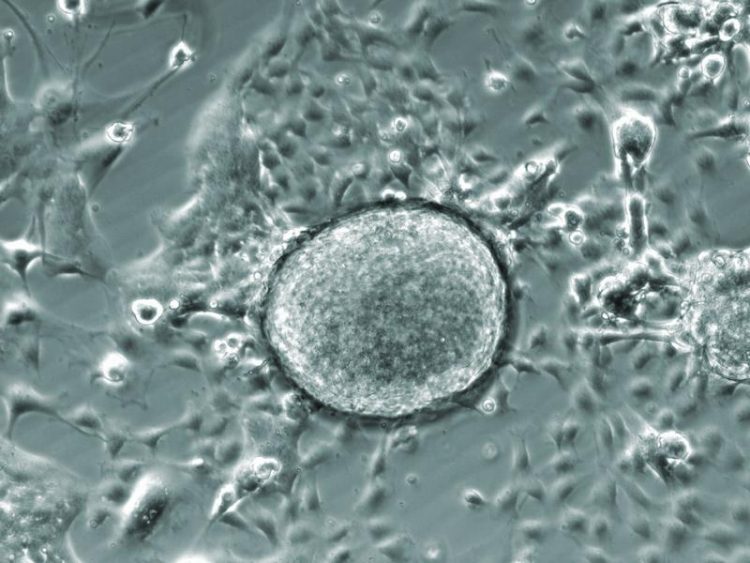China’s Max Planck Center scientists unravel initial steps of iPS technology

Reprogramming in a dish Max Planck Center / V. Malik, R. Jauch
The insights can make iPS-reprogramming of body cells more quickly, efficiently and faithfully – a prerequisite for such cells to be used for example in treating disease caused by cellular damages.
Ever since the discovery of factor-induced reprogramming, many laboratories have worked on unraveling its mechanisms. Whereas some laboratories classified Oct4, Sox2, Klf4 as pioneer factor others showed that these are not pioneer factors and mainly bind open chromatin. Thus, the topic remained controversial.
A Max Planck Center team, led by graduate student Vikas Malik and his mentor Ralf Jauch, focused on the regulatory proteins called Oct4 and Sox2 that were known to play dominant roles in the reprogramming process:
Oct4 and Sox2 are long known to work together to regulate genes required for self-renewal and pluripotency of stem cells. The edge of their work, however, was that they used a modified version of Oct4 that does not interact with Sox2.
“We compared how the mutant and wildtype Oct4 in conjunction with Sox2 bind, crop out and turn on genes with factors that cannot make pluripotent cells”, explains Vikas Malik. “We made some very surprising discoveries”, says Vikas Malik.
“First of all, we discovered that Sox2 rather than Oct4 is the initiating key factor in reprogramming: Sox2 ‘attacks’ pluripotency genes that otherwise slumber in differentiated cells and opens them up – a pre-requisite for their later activation. Oct4 is not really important at this initial phase and rather plays the role of a replaceable assistant.”
Yet, the uniqueness of Oct4 becomes evident at later stages of reprogramming: “To eventually turn on the network of genes needed for a cell to become pluripotent, Sox2 and Oct4 intermingle tightly and do the job together”, says Vikas Malik. Once cells have become pluripotent, Oct4 takes the lead and its tight association with Sox2 becomes less critical.
“Our insights will provide inspirations to tinker with Sox2, Oct4, and related factors to interconvert the state of body cells more quickly, efficiently and faithfully so these programmed can eventually be used to treat disease caused by cellular damages”, says Ralf Jauch.
The work was an international effort by scientists from Guangzhou in Mainland China, Hong Kong, the United States, and Germany and was conducted within the vibrant environment of the GIBH – Max Planck Center for Regenerative Biomedicine.
“This publication is an excellent example of the benefits of Max Planck Centers”, says Ralf Jauch, He was Principal Investigator and Professor at the Guangzhou Institutes of Biomedicine and Health and has now moved to the School of Biomedical Science of the University of Hong Kong. “Without the uncomplicated cooperation with our partners from the Max Planck Institutes for Molecular Biomedicine and for Heart and Lung Research, we could not have accomplished these studies.”
About the Max Planck – GIBH Joint Center for Regenerative Biomedicine:
Max Planck Centers (MPCs) are scientific cooperation programmes by the Max Planck Society which add a new quality to the scientific cooperations with top foreign partners in forward-looking research areas. The Max Planck Institutes involved and their international partners contribute their experiences and expertise, adding scientific value by combining complementary methods and knowledge. The GIBH – Max Planck Center for Regenerative Biomedicine started in 2016 and was the first Max Planck Center in China. In the year 2020, the GIBH – Max Planck Center for Regenerative Biomedicine will be the first MPC worldwide to have its own large laboratory.
Dr. Ralf Jauch
Associate Professor
School of Biomedical Sciences
Li Ka Shing Faculty of Medicine
The University of Hong Kong
Tel. +852 3 917-9511
E-mail: ralf@hku.hk
Malik, V.; Glaser, L. V.; Zimmer, D.; Velychko, S.; Weng, M.; Holzner, M.; Arend, M.; Chen, Y.; Srivastava, Y.; Veerapandian, V.; Shah, Z.; Esteban, M. A.; Wang, H.; Chen, J.; Schöler, H. R.; Hutchins, A. P.; Meijsing, S. H.; Pott, S.; Jauch, R.: Pluripotency reprogramming by competent and incompetent POU factors uncovers temporal dependency for Oct4 and Sox2. Nature Communications, DOI:10.1038/s41467-019-11054-7 (published online)
https://www.mpi-muenster.mpg.de/501763/20190802-mpc-ips-malik-jauch
Media Contact
All latest news from the category: Life Sciences and Chemistry
Articles and reports from the Life Sciences and chemistry area deal with applied and basic research into modern biology, chemistry and human medicine.
Valuable information can be found on a range of life sciences fields including bacteriology, biochemistry, bionics, bioinformatics, biophysics, biotechnology, genetics, geobotany, human biology, marine biology, microbiology, molecular biology, cellular biology, zoology, bioinorganic chemistry, microchemistry and environmental chemistry.
Newest articles

Properties of new materials for microchips
… can now be measured well. Reseachers of Delft University of Technology demonstrated measuring performance properties of ultrathin silicon membranes. Making ever smaller and more powerful chips requires new ultrathin…

Floating solar’s potential
… to support sustainable development by addressing climate, water, and energy goals holistically. A new study published this week in Nature Energy raises the potential for floating solar photovoltaics (FPV)…

Skyrmions move at record speeds
… a step towards the computing of the future. An international research team led by scientists from the CNRS1 has discovered that the magnetic nanobubbles2 known as skyrmions can be…





















